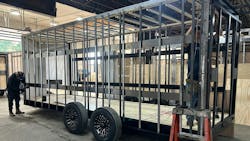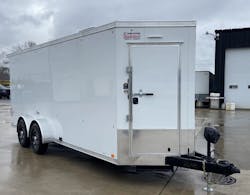There are two things mobile tool distributors never have enough of: time and retail space.
While we can’t do anything about the hours in a day, many mobile tool distributors are increasing their retail space and growing their sales by utilizing custom enclosed trailers in their tool businesses.
More space, more products
With the ever-growing variety of products your customers demand as they service today’s complex vehicles, most tool trucks are at their limits for effectively merchandising products. Large tool storage units, tire service equipment, air compressors, bead blasters, parts washers, ADAS systems, welding equipment, and more just aren’t practical for display in most tool trucks. Purpose-built enclosed trailers are the perfect way to expose those big-ticket items to the dangers of being sold by showing them to your customers.
Pulling up to your customer’s shop with a trailer creates a different sales environment than your normal weekly visit with your display van. You can create a sales event focused on the specific products you have displayed in the trailer instead of the routine week-to-week interaction you have with your customers in your tool truck. Planning and preparation go a long way to having an effective event, so targeting specific customers and shops for the products you are promoting and having pre-arranged financing options can be helpful.
Enclosed trailers are also great for promoting your business and products outside of your customers’ shops at events like car shows, racing events, trade shows, tech schools, county fairs, bike nights, and community events.
Tim Herr of Herr Display Vans reports seeing increased requests for custom enclosed trailers for mobile tool distributors. He shared that his "customers are using trailers not only for the larger items such as tool storage, but to be able to continue to service their customers and generate sales if their tool truck is down for maintenance or repair. Unexpected mechanical problems or accident damage can sideline a tool truck at any time, so an enclosed trailer is a great back-up plan.”
Finding the right trailer
Finding the right enclosed trailer for your mobile tool business is just as important as helping your customers select the right tools and equipment for their needs. Most “off the lot” cargo trailers are light duty and not well suited for transporting and displaying tool cabinets and shop equipment; they are intended for carrying vehicles and evenly distributed loads. Distributors' products tend to be very heavy and concentrate the load in a small footprint, and basic trailers are not designed to have heavy loads secured to their walls. Custom trailers can be ordered with structural upgrades such as 12” on-center construction for floor crossmembers, wall posts, and roof bows instead of the 16” or even 24” on-center construction frequently found in enclosed trailers. Double floors, reinforced ramp doors, welded, recessed e-track, and heavier gauge exterior aluminum are available as well.
Size
The size and type of enclosed trailer are important. Knowing the dimensions and weights of the products you plan on displaying will help you decide the proper trailer for your needs. One fundamental consideration is trailer width. Seven-foot-wide trailers have no wheel box wells inside the trailer (external fenders), so your wall space is flat for securing your products. They are typically about 80” in interior width, wall-to-wall. Eight-and-a-half-foot trailers will have a wider interior width of 96” or so, wall-to-wall. However, there will be wheel boxes inside the trailer (typically about an 81” width between the wheel boxes) that somewhat limit where and how you secure and display your products.
Flat front vs. V-nose
You can also choose between flat front or V-nose trailers. Often, mobile tool distributors choose V-nose configurations so they can place the entry door in the curbside of the V-nose and not waste any display space along the side walls of the trailer. The interior height of the trailer (and, critically, the height of the rear door opening) must be able to accommodate taller items such as tool cabinets, air compressors, ADAS/alignment equipment, and more. Seven feet is typically the minimum interior height for this application. Taller trailers also allow for longer ramp doors, which create a lower ramp door angle for easier loading.
Route type
Another consideration is the type of route you are servicing. Is it urban and congested, or more rural and open? Wider, longer trailers are less maneuverable and may pose issues accessing your customer’s locations.
Custom-built
Jason Dietsch of Jason Dietsch Trailer Sales estimates he has sold over 500 custom-built trailers to mobile tool distributors over the years.
“The majority of the trailers we sell to mobile tool distributors are 16’ to 20’ in length, and it’s about evenly divided between 7’ wide and 8.5’ wide trailers," Dietsch said. He also noted popular options include heavy duty 12-inch on-center construction, tandem 7,000 lb torsion axles, double floors, welded, recessed e-track (which really strengthens the trailer walls), finished interiors with white aluminum or carpeted walls, interior and exterior lighting, 110V electrical service, roof A/C units, and winches.
Trailer weight
Enclosed trailers used for this application typically will have a gross vehicle weight rating (GVWR) of 10,000 to 14,000 lbs, so they are generally towed behind 3/4- or 1-ton trucks. Don’t have a 3/4- or 1-ton truck? No problem! Enterprise Truck Rental and others rent both gas and diesel 3/4 and 1-ton pickups at surprisingly reasonable daily and weekly rates, perfect for occasional use with a trailer.
Does a trailer make sense for you?
Would your business benefit from an investment in a custom enclosed trailer? The answer is, it might very well if you ...
- ... are looking to grow your sales of big-ticket items and increase sell-through of focused promotions while interacting with your customers in a different environment.
- ... want to have a backup plan to service your customers and profitably run your business in the event your tool truck is not available.
- ... need more storage space for inventory.
- ... would like a way to pick up or deliver used tool cabinets or equipment, or move customer tool storage units, other than using your tool truck.
- ... have, or are planning to have, multiple routes and are using other employees or family members in your business.
- ... are looking for a Part 179 tax deduction for your business.
Next steps
Ok, you’ve decided a custom enclosed tool trailer could help you grow your sales. Now what? First, decide HOW you plan to use the trailer and WHAT you plan to transport/display in the trailer to help in selecting the proper size and configuration of the trailer. Then, find a reputable trailer manufacturer that offers custom commercial-grade cargo trailers and find a knowledgeable trailer dealer capable of ordering a custom trailer for your needs. Please note, there is typically a 6-12 week lead time on custom trailer builds.
There are endless examples of successful sales events and promotions using enclosed trailers, so reach out to other mobile distributors, your suppliers, and franchisors for ideas you can put to work in your mobile tool business. Happy selling!
About the Author

Bob Bischak
Bob Bischak is the director of sales for United Trailers, a leading manufacturer of enclosed cargo and race car trailers. Bischak began his career as an engineer in the automotive industry prior to 18 years as a mobile tool distributor and 15 years in management at a major tool company.

